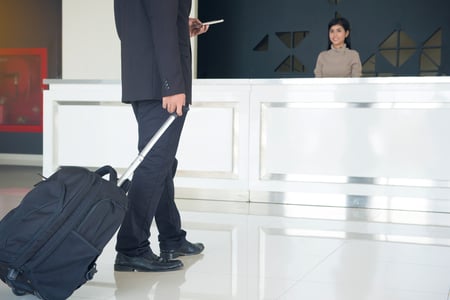Conventions and trade shows are back in a big way — but the crowd of attendees is smaller.
People are buying more business-class airfares — but companies continue to limit their employees’ travel.
Business travel within the United States is picking up steam — but international business travel may not recover fully until 2026.
The upshot: Work-related travel is bouncing back from its COVID hiatus, but the hospitality industry shouldn’t expect things to be exactly the same. What can hotel operators do to win back the business traveler?
Understand what’s driving the uptick in business travel.
Why are people traveling for work? The number-one reason (31%) is sales or account management meetings with current or prospective customers, according to a recent survey by the Global Business Travel Association. Other reasons for travel:
- Conferences, trade shows and industry events (21%)
- Internal company meetings (17%)
- Employee training (10%)
- Service trips for current customers (10%)
- Supplier meetings (9%)
Consider how your hotel can best cater to “business transients”: people who are traveling alone or with just a few colleagues and are taking a brief trip for business meetings. That segment “has not recovered at the pace of leisure, but we are seeing steady improvement, particularly as you see more and more folks returning to the office,” Marriott CEO Anthony Capuano tells Barron’s.
Address COVID concerns.
In general, business travelers are feeling more comfortable about hitting the road. The June GBTA survey found that 89% of travel managers say their company’s employees are somewhat willing or very willing to travel. They’re also more likely to say that government policies and restrictions are having a significant impact on travel (43%) compared to COVID infection rates and variants (38%).
What can hotels do to increase ease and comfort? Many hotel chains continue to offer flexible cancellation policies. Contactless check-in remains popular (and can help operators compensate for staffing shortages). The intensive surface-sanitizing efforts seen in the beginning of the pandemic are being phased out, but visible cleanliness remains important to guests.
Spiff up the guestroom amenities.
Ongoing staffing shortages in hospitality mean that service has suffered. “All but the most luxurious hotels generally no longer clean guest rooms daily, instead offering only fresh towels and garbage removal,” The New York Times says. Guests are becoming accustomed to less frequent cleanings, but they still expect the comforts of home.
Upgrading the amenities can help. Consider adding products such as:
- A high-quality, K-cup-style coffeemaker such as the HDC311 Single-Serve Coffeemaker, which is compatible not only with Keurig, but other makers.
- An ultra-quiet Clorox True HEPA Air Purifier, made by Hamilton Beach, which uses 3-part filtration to remove allergens, harmful particulates, bacteria and viruses from indoor air.
- An in-room tablet that allows guests to order meals, adjust the temperature, or make housekeeping requests. An Oracle Hospitality-Skift survey found that 73% of travelers are more likely to stay at a hotel that offers self-service technology to minimize contact with the staff and other guests.
Offer extended-stay features for bleisure travelers.
Remote work has led more business travelers to extend their trips, tacking on a few extra days for vacation or simply a chance to explore a new city. “To meet the demand of both bleisure and family travelers, hotel partners are introducing new room types focused on longer stays,” Nadiya Makarenko, senior vice president of Travel Edge Network, tells Forbes. “These room types are offered in a variety of price ranges, characterized by apartment elements that allow for long-stay comfort.”
Extended-stay amenities attract these bleisure travelers as well as nomadic workers who want to stay a while. These include toasters, blenders, electric can openers, kettles and full-size coffeemakers.
Read more: The Triumph of Extended-Stay Hotels
Speed up service in hotel restaurants and bars.
Forest products wholesaler Ryan Chitwood told NBC News about the hotel dining dilemmas his team faced during a recent trade show: “Our tight schedule was derailed, because what should have been brief breakfasts and lunches ran way over because of staffing shortages,” he said. “Also, when you arrive late and want to check in and grab a burger at the bar or via room service and it’s not available, you either need to leave the property — or just go hungry.”
Don’t let business travelers — or any guests — get hangry. When your kitchen or bar is short-staffed, having the right equipment can help your F&B team get more done, more quickly.
For instance, the PrimaVac™ line of in-chamber vacuum sealers accelerates prep work. Staff can prepare everything from scrambled eggs to salmon amandine and vacuum-seal precisely sized portions that are ready to cook a la minute.
Browse the full line of Hamilton Beach Commercial hospitality products.


